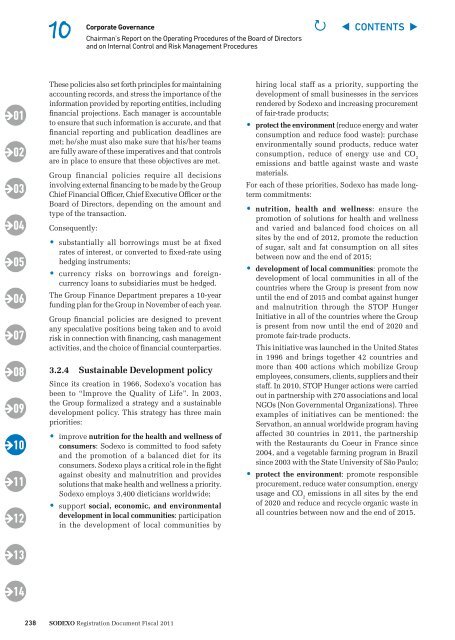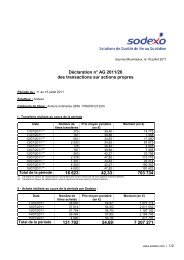Registration Document
Registration Document
Registration Document
You also want an ePaper? Increase the reach of your titles
YUMPU automatically turns print PDFs into web optimized ePapers that Google loves.
01<br />
02<br />
03<br />
04<br />
05<br />
06<br />
07<br />
08<br />
09<br />
10<br />
11<br />
12<br />
13<br />
14<br />
238<br />
10<br />
Corporate Governance<br />
Chairman’s Report on the Operating Procedures of the Board of Directors<br />
and on Internal Control and Risk Management Procedures<br />
These policies also set forth principles for maintaining<br />
accounting records, and stress the importance of the<br />
information provided by reporting entities, including<br />
financial projections. Each manager is accountable<br />
to ensure that such information is accurate, and that<br />
financial reporting and publication deadlines are<br />
met; he/she must also make sure that his/her teams<br />
are fully aware of these imperatives and that controls<br />
are in place to ensure that these objectives are met.<br />
Group financial policies require all decisions<br />
involving external financing to be made by the Group<br />
Chief Financial Officer, Chief Executive Officer or the<br />
Board of Directors, depending on the amount and<br />
type of the transaction.<br />
Consequently:<br />
• substantially all borrowings must be at fixed<br />
rates of interest, or converted to fixed-rate using<br />
hedging instruments;<br />
• currency risks on borrowings and foreigncurrency<br />
loans to subsidiaries must be hedged.<br />
The Group Finance Department prepares a 10-year<br />
funding plan for the Group in November of each year.<br />
Group financial policies are designed to prevent<br />
any speculative positions being taken and to avoid<br />
risk in connection with financing, cash management<br />
activities, and the choice of financial counterparties.<br />
3.2.4 Sustainable development policy<br />
Since its creation in 1966, Sodexo’s vocation has<br />
been to “Improve the Quality of Life”. In 2003,<br />
the Group formalized a strategy and a sustainable<br />
development policy. This strategy has three main<br />
priorities:<br />
• improve nutrition for the health and wellness of<br />
consumers: Sodexo is committed to food safety<br />
and the promotion of a balanced diet for its<br />
consumers. Sodexo plays a critical role in the fight<br />
against obesity and malnutrition and provides<br />
solutions that make health and wellness a priority.<br />
Sodexo employs 3,400 dieticians worldwide;<br />
• support social, economic, and environmental<br />
development in local communities: participation<br />
in the development of local communities by<br />
Sodexo <strong>Registration</strong> <strong>Document</strong> Fiscal 2011<br />
P ◀ CONTENTS ▶<br />
hiring local staff as a priority, supporting the<br />
development of small businesses in the services<br />
rendered by Sodexo and increasing procurement<br />
of fair-trade products;<br />
• protect the environment (reduce energy and water<br />
consumption and reduce food waste): purchase<br />
environmentally sound products, reduce water<br />
consumption, reduce of energy use and CO 2<br />
emissions and battle against waste and waste<br />
materials.<br />
For each of these priorities, Sodexo has made longterm<br />
commitments:<br />
• nutrition, health and wellness: ensure the<br />
promotion of solutions for health and wellness<br />
and varied and balanced food choices on all<br />
sites by the end of 2012, promote the reduction<br />
of sugar, salt and fat consumption on all sites<br />
between now and the end of 2015;<br />
• development of local communities: promote the<br />
development of local communities in all of the<br />
countries where the Group is present from now<br />
until the end of 2015 and combat against hunger<br />
and malnutrition through the STOP Hunger<br />
Initiative in all of the countries where the Group<br />
is present from now until the end of 2020 and<br />
promote fair-trade products.<br />
This initiative was launched in the United States<br />
in 1996 and brings together 42 countries and<br />
more than 400 actions which mobilize Group<br />
employees, consumers, clients, suppliers and their<br />
staff. In 2010, STOP Hunger actions were carried<br />
out in partnership with 270 associations and local<br />
NGOs (Non Governmental Organizations). Three<br />
examples of initiatives can be mentioned: the<br />
Servathon, an annual worldwide program having<br />
affected 30 countries in 2011, the partnership<br />
with the Restaurants du Coeur in France since<br />
2004, and a vegetable farming program in Brazil<br />
since 2003 with the State University of São Paulo;<br />
• protect the environment: promote responsible<br />
procurement, reduce water consumption, energy<br />
usage and CO 2 emissions in all sites by the end<br />
of 2020 and reduce and recycle organic waste in<br />
all countries between now and the end of 2015.
















